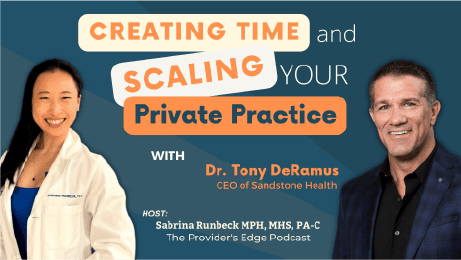
Revolutionizing Healthcare:
Cultivating Passion, Empathy, and Love
In this insightful episode, we embarked on a journey to explore the key factors that drive healthcare transformation. From the power of passion and love in serving others to the profound impact of the doctor-patient relationship, we gained valuable insights into creating a patient-centered approach. As healthcare leaders, innovators, and executives, we have the opportunity to revolutionize healthcare by cultivating empathy, overcoming fear, and fostering a culture of love. Together, let us delve into these essential elements and embark on a transformative path towards better healthcare for all.
As we delved into the world of healthcare transformation, several key factors emerged as critical components in revolutionizing the industry. By examining the importance of passion and love, the profound impact of the doctor-patient relationship, the challenges faced by the healthcare industry, the significance of quality care and individual motivation, and the transformative nature of overcoming fear and cultivating love, we gained valuable insights to reshape the healthcare landscape.
Listen anywhere you get your podcastin' on.

Show Summary
I engaged in a captivating conversation with Dr. Carl Lavorata, an experienced dentist known for his unwavering commitment to dentistry and cultivating meaningful connections with his patients. As they delve into the challenges confronting modern healthcare, Dr. Lavorata highlights the detrimental impact of the insurance-based model on the doctor-patient relationship. He emphasizes the importance of preserving this sacred bond while mentoring the next generation of healthcare professionals to ensure the best possible care for the community. Additionally, the discussion delves into the profound effects of COVID-19 on healthcare and the complexities of hiring staff. Generally, this episode concludes the exploration of the destructive power of fear within the healthcare industry and the transformative potential of love and personal growth.
Episode Timeline:
[00:02:50] - The Importance of Caring for Others
[00:09:35] - Challenges Facing Healthcare Today
[00:06:23] - The Impact of Humor in Building Patient Relationships
[00:12:11] - Today Mentoring the Next Generation
[00:17:43] - The Importance of Serving Patients
[00:20:18] - The Importance of Staff Training
[00:25:26] - Challenges in Hiring Healthcare Workers
[00:28:55] - The Negative Effects of Fear in Healthcare
[00:31:32] - Fear and its impact
[00:34:35] - Importance of love and meditation
1. Passion for Serving Others:
Having a genuine passion for serving others is not just a desirable trait; it is crucial in the healthcare industry. Patients have an innate ability to sense the level of care and dedication from healthcare providers. When healthcare professionals approach their work with passion and empathy, it creates a ripple effect that positively impacts the entire patient experience.
A strong team with a shared passion for serving others is essential for delivering high-quality healthcare. When team members genuinely care about the well-being of their patients, they go above and beyond their professional duties to ensure that patients feel seen, heard, and cared for. This genuine care can bring a sense of comfort and reassurance to patients, fostering a stronger connection between the healthcare provider and the individual seeking care.
Nurturing a culture of passion and empathy starts at the organizational level. Healthcare leaders have the responsibility to create an environment that values and supports their employees' passion for serving others. This can be achieved through regular communication, recognition of achievements, and opportunities for professional growth and development. When healthcare professionals are supported and encouraged in their passion, it translates into improved patient outcomes and overall satisfaction.
2. Importance of Doctor-Patient Relationship:
The doctor-patient relationship lies at the heart of healthcare. It is a unique bond built on trust, empathy, and effective communication. When patients feel valued, respected, and supported by their healthcare providers, it enhances their overall experience and contributes to better health outcomes.
Approaching patients with respect and care is fundamental to establishing a strong doctor-patient relationship. Taking the time to listen attentively, showing empathy, and addressing patients' concerns and fears can create a safe space for open communication. This helps patients feel comfortable sharing their symptoms, medical history, and any anxieties they may have.
A positive doctor-patient relationship goes beyond medical expertise. It involves treating patients as individuals with unique needs and preferences. By involving patients in their care decisions and explaining treatment options in a clear and understandable manner, healthcare providers can empower patients to actively participate in their healthcare journey.
3. Challenges in the Healthcare Industry:
The healthcare industry faces numerous challenges that impact the delivery of quality care. One of the significant challenges is the difficulties in hiring and retaining skilled professionals. Even before the COVID-19 pandemic, there was a shortage of healthcare workers in various specialties. The pandemic has further exacerbated this issue, with increased demands for healthcare services and the strain it has placed on the existing workforce.
The fear related to the pandemic has had a profound impact on both the healthcare workforce and patient experiences. Healthcare professionals have faced unprecedented levels of stress, burnout, and emotional exhaustion. The fear of contracting the virus, concerns about personal safety, and the overwhelming workload have taken a toll on their well-being. Consequently, this can have a direct impact on the quality of care provided.
Moreover, patients have experienced fear and uncertainty when seeking healthcare services. The fear of exposure to the virus has led to avoidance of necessary medical visits, delays in seeking timely care, and increased anxiety about the healthcare environment. Addressing these challenges requires a multifaceted approach that focuses on ensuring the well-being of healthcare professionals, implementing safety measures, and rebuilding trust with patients.
4. Importance of Quality and Patient Experience:
Providing quality care and ensuring a positive patient experience are vital components of healthcare delivery. Quality care goes beyond medical expertise and encompasses factors such as patient safety, effective communication, and personalized treatment plans. When patients receive high-quality care, they experience better health outcomes and increased satisfaction with their healthcare journey.
Eliminating fear from the patient's perspective is crucial for delivering quality care. Patients should feel safe, comfortable, and supported throughout their healthcare experience. This can be achieved by creating a welcoming environment, addressing patient concerns promptly, and involving them in decision-making processes. When patients feel heard and involved in their care, it instills confidence and trust in the healthcare provider.
Supporting both staff and patients through challenges is another essential aspect of delivering quality healthcare. Healthcare leaders must prioritize the well-being and professional development of their teams. By fostering a culture that values continuous learning, providing resources for skill enhancement, and promoting a healthy work-life balance, healthcare organizations can cultivate a motivated and engaged workforce.
5. Understanding Individual Motivation and Engagement:
Understanding the individual motivations and engagement of healthcare professionals is essential for creating a thriving and effective healthcare workforce. While external factors such as financial incentives and job titles play a role, intrinsic motivation, and personal engagement are key drivers of job satisfaction and performance.
Healthcare leaders and executives must recognize that each team member is unique and has different motivations. Aligning individual motivations with the organization's mission and values can create a sense of purpose and fulfillment. By fostering a culture that appreciates personal growth and development, healthcare leaders can empower their staff to excel in their roles.
Meaningful conversations with staff are also critical for understanding their motivations and engagement. Regular check-ins, feedback sessions, and mentorship opportunities provide a platform for open dialogue and a deeper understanding of individual needs and aspirations. This enables leaders to tailor their support and create opportunities that resonate with their team members.
Understanding individual motivations and fostering engagement is an ongoing process that requires active listening, empathy, and flexibility. By investing in their staff and creating a culture that values their contributions, healthcare leaders can cultivate a motivated and engaged workforce that is committed to delivering exceptional care.
Revolutionizing healthcare requires a collective effort from healthcare leaders, innovators, and executives. By embracing a culture of empathy, cultivating passion, and acknowledging the transformative power of the doctor-patient relationship, we can pave the way for a patient-centered healthcare ecosystem. Addressing industry challenges, prioritizing quality and patient experience, understanding individual motivation and engagement, and embracing love and compassion are key elements in creating a patient-centered healthcare system. Together, let us commit to these principles and work towards a future where empathy, innovation, and collaboration drive positive change in healthcare for the betterment of all.
Listen to the podcast to learn more about aligning your work with your value system, organizing your life, finding inspiration, and stress management not included in this post. This article is a summary of my conversation with Dr. Carl Lavorata on episode #55 of the Provider's Edge Podcast. Subscribe 


Recommended Podcast Episodes
Ep 55
Embracing Food Identify:Healing modern-day gut issues through traditional healing foods with Dr Sara
Be a guest on our show
The Provider's Edge show is always looking to feature healthcare change-makers and celebrate the work they are doing to improve healthcare.
Together, we can encourage other healthcare entrepreneurs and startup founders to up-level their businesses.If you or someone you know could be a good fit as a guest on the show, please click on the bottom below to apply as a speaker.
Healthcare Entrepreneurs!
I can help you gain visibility and credibility in the right circles so you can accelerate your mission and profitability!After overcoming burnout working in surgery, I went back to my roots in neuroscience and public health. I learned the importance of building key human relationships with my team throughout our organization.While helping healthcare executives and entrepreneurs to get out of the day-to-day operation of their practice, I realized I needed more visibility and more connections to reach my ideal clients.Once I set out to be highly visible in the right circles, I was able to leverage my network of strategic partners to convert clients 5x higher than any other marketing channel I had tried previously.Now I help healthcare change-makers to accelerate their impact and increase profitability by gaining visibility and credibility with the right strategic partners.My clients no longer worry about where their next client is coming from, the need to plan additional budget for ads spending, or losing the ability to connect with others because their social media account is shut down.If you want to share your social mission with the world and gain pivotal supporters that become loyal clients... then you are in the right place, with the right consultant who is also a recovered clinician.




